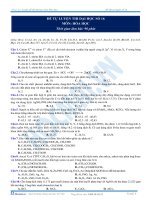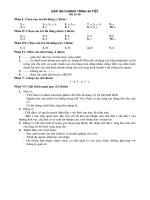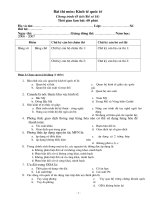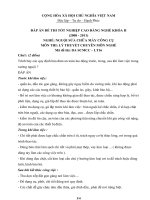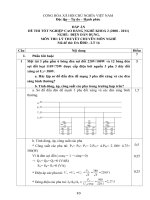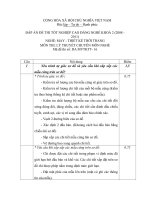PASSAGE 16
Bạn đang xem bản rút gọn của tài liệu. Xem và tải ngay bản đầy đủ của tài liệu tại đây (35.12 KB, 2 trang )
PASSAGE 16
Among the most popular questions addressed in online communication research is the extent to which
Internet use leads to undesirable psychosocial outcomes such as depression and loneliness. Evidence
suggests that certain motivations to communicate online can have negative consequences, as the Internet
itself can, for some, serve as an object of compulsive use. Individuals' compulsive Internet use (CIU)
refers to their inability to control, reduce, or stop their online behavior, while excessive Internet use (EIU)
is the degree to which an individual feels that he or she spends an excessive amount of time online or
even loses track of time when using the Internet. For those who are unable to limit their use, time spent
online may produce negative outcomes such as depression, loneliness and limited face-to-face contacts.
Joseph Mazer, assistant professor at Clemson University and Andrew M. Ledbetter, assistant professor at
Texas Christian University published an article today in Southern Communication Journal that explores
how specific online communication attitudes —such as individuals' tendency for online self-disclosure,
online social connection and online anxiety-predicted their compulsive and excessive Internet use and, in
turn, poor well-being.
Mazer and Ledbetter found that an individual's tendency for online self-disclosure and online social
connection led them to use the Internet in more compulsive ways. If a person has poor face-to-face
communication skills, that individual will likely be more attracted to the social features of online
communication, which can foster CIU. Prior research suggests that socially anxious individuals perceive
online communication environments as less threatening and, as a result, are more likely to seek out
communication in those settings. The findings from Mazer and Ledbetter's study are not entirely
consistent with this claim, which may suggest that researchers adjust their theoretical image of the
compulsive user: Whereas previous research frames online communication as a safe activity for the
socially anxious to escape their communication anxiety, Mazer and Ledbetter found that compulsive users
also experience anxiety when communicating online.
To the extent that socially anxious individuals are drawn to the Internet, such anxiety seems to stimulate
compulsive, but not necessarily excessive, use. Rather, excessive users seem to have a more realistic
perception of online communication as convenient but sometimes limited in communicative effectiveness
by a lack of social cues often available in face-to-face interactions. In other words, according to Mazer
and Ledbetter's study, individuals' anxiety motivates CIU, while efficiency seems to motivate EIU.
Mazer and Ledbetter found that CIU, not EIU, led individuals to experience poor well-being outcomes.
Given their widespread proliferation and adoption, especially among younger users, social networking
sites now represent an important medium for maintaining social connections. Their existence raises
important questions regarding individual traits that might influence online communication frequency and
how excessive participation in these sites might foster compulsive and excessive Internet use.
Question 1. What is the best title of the passage?
A. The negative effects of Internet use.
B. The feelings of Internet users.
C. The research on Internet.
D. The importance of Internet.
Question 2. What are the negative outcomes of online communication mentioned in paragraph 1?
A. melancholy and loneliness
B. depression and sadness
C. depression and happiness
D. happiness and loneliness
Question 3. The phrase "lose track of" in the first paragraph is closest in meaning to _________
A. be aware of
B. be able to
C. be unaware of
D. be unable to
Page 1
Question 4. What does not Southern Communication Journal explore about specific online
ommunication?
A. individuals' tendency for online self-disclosure
B. online social connection
C. online anxiety
D. online social outcomes
Question 5. According to paragraph 3, what sentence is TRUE?
A. A person who has poor face-to-face communication skills will be less attracted to online
communication.
B. People who are socially worried find online communication environments dangerous.
C. Mazer and Ledbetter's findings are different from those of prior research.
D. Compulsive users don't experience anxiety when communicating online.
Question 6. The possessive adjective "their" in paragraph 3 refers to _________
A. researcher's
B. the finding's
C. Mazer and Ledbetter's D. those settings'
Question 7. According to Mazer and Ledbetter, what stimulates EIU?
A. individuals' anxiety
B. efficiency
C. realistic perception
D. face-to-face interactions
Question 8. The word "medium" in the last paragraph could best be replaced by _________
A. height
B. length
C. means
D. measurement
ĐÁP ÁN
1-A
2-A
3-C
6-A
7-B
8-C
4-D
5-C
Page 2

